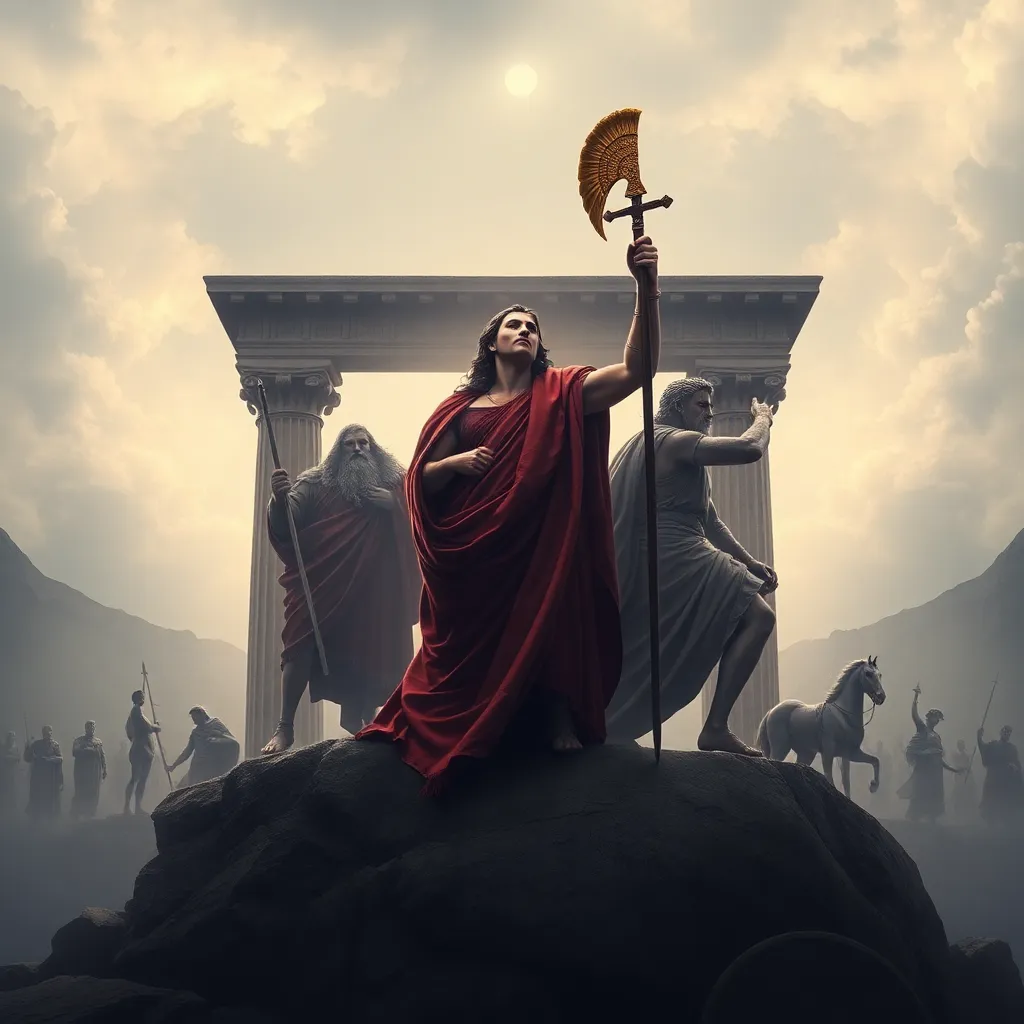The Iliad and Its Reflection on Heroism and Valor
I. Introduction
“The Iliad,” attributed to the ancient Greek poet Homer, stands as one of the greatest works of literature in Western history. Composed in the 8th century BCE, this epic poem recounts a brief period during the Trojan War, focusing on the hero Achilles and his conflict with King Agamemnon. The significance of “The Iliad” extends beyond its narrative, delving into complex themes of heroism and valor that resonate through time.
This article aims to explore how “The Iliad” reflects and shapes the concepts of heroism, examining the characteristics of heroes, their motivations, and the implications of their valorous deeds.
II. Historical Context of “The Iliad”
The backdrop of “The Iliad” is the legendary Trojan War, a pivotal event in Greek mythology that symbolizes the struggle between great powers and the quest for honor. Archaeological evidence suggests that the war may have roots in historical conflicts around the 12th century BCE, though the details are steeped in myth.
Oral tradition played a crucial role in preserving these heroic narratives. Stories of valor and glory were passed down through generations, shaping the cultural landscape of ancient Greece. Heroic narratives were not merely entertainment; they served as moral frameworks and exemplars of virtue for society.
In ancient Greek culture, heroism was intertwined with identity. Heroes were celebrated not only for their martial prowess but also for their role as protectors of their communities, embodying the values of courage and honor.
III. Defining Heroism in “The Iliad”
In Homeric literature, the characteristics of a hero include:
- Courage in battle
- Strength and physical prowess
- A noble lineage or status
- Wisdom and strategic thinking
- A deep sense of honor and duty
However, heroism in “The Iliad” is marked by a duality: the pursuit of glory often clashes with the reality of mortality. Characters like Achilles and Hector embody this tension, as they strive for eternal fame while grappling with the inevitable consequences of war.
Achilles, the quintessential Greek hero, is driven by a desire for glory, often resulting in tragic outcomes. Conversely, Hector, the Trojan prince, represents duty and familial honor, showcasing a different facet of heroism.
IV. The Role of Valor in the Lives of the Characters
Valor is paramount in the lives of the characters in “The Iliad.” It defines their identities and shapes their destinies. Key instances of valor include:
- Achilles’ fierce combat against the Trojans, driven by personal vengeance.
- Hector’s courageous defense of Troy, motivated by love for his family and city.
- Patroclus’ brave decision to don Achilles’ armor and fight in his stead, leading to his tragic downfall.
The consequences of these valorous actions are profound. Achilles’ wrath leads to the death of many, while Hector’s bravery ultimately results in his demise. Such actions not only affect the individuals but also reverberate through their communities, shaping the legacy of their heroism.
V. The Relationship Between Honor and Heroism
Honor is a central theme in “The Iliad,” intricately linked to the concept of heroism. In Greek culture, honor is often derived from one’s achievements in battle and the respect garnered from peers. The motivations behind heroic actions can be seen as both personal and communal:
- Personal honor drives characters like Achilles, who seeks recognition and respect.
- Communal honor is evident in Hector’s fight for Troy, embodying the spirit of his people.
Honor influences relationships and rivalries among the characters. The conflict between Achilles and Agamemnon arises from a perceived slight to Achilles’ honor, illustrating how fragile reputations can ignite fierce discord.
VI. The Complexity of Heroism: Flaws and Vulnerabilities
Homer presents heroes as complex figures, imbued with flaws and vulnerabilities. This portrayal adds depth to their characterizations:
- Achilles’ rage and pride lead him to withdraw from battle, causing significant consequences for his comrades.
- Hector’s sense of duty often blinds him to the dangers he faces, ultimately leading to his tragic end.
The tension between personal desires and heroic ideals is a recurring theme. Achilles struggles between his longing for a peaceful life and the call of glory, while Hector grapples with his responsibilities as a warrior and a family man. These internal conflicts highlight the human aspect of heroism, making their stories relatable even in modern contexts.
VII. The Legacy of Heroism in “The Iliad”
“The Iliad” has profoundly influenced later interpretations of heroism across various cultures and literary works. Its themes continue to resonate in contemporary discussions of bravery, sacrifice, and the human condition. The archetypal heroes of Achilles and Hector have inspired countless adaptations, demonstrating the enduring nature of their stories.
In modern storytelling, the complexities of heroism depicted in “The Iliad” are reflected in various media, from literature to film. Characters who embody flawed heroism echo the struggles of Achilles and Hector, reminding audiences that heroism is not always about perfection but often about the courage to confront one’s own flaws.
VIII. Conclusion
In summary, “The Iliad” offers profound insights into the nature of heroism and valor, exploring the characteristics, motivations, and consequences of heroic actions. The themes of honor, complexity, and legacy remain relevant, shaping our understanding of what it means to be a hero.
As we reflect on the timeless nature of these themes, it is evident that exploring heroism in literature enriches our comprehension of human experiences, aspirations, and the moral dilemmas that define our lives.




